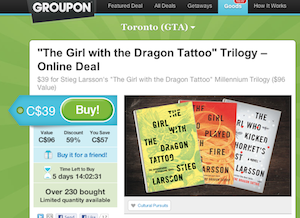 This week, Penguin Group (Canada) ran a Groupon offer for one of their most popular series, the Millenium Trilogy by Stieg Larsson. The deal appeared to be Canada-wide and it offered all three titles in hardcover for $39, a 59% discount off the original price. This may not seem that impressive to savvy book industry folk, but it is quite a savings for consumers who either prefer hardcover or aren’t aware of the cheaper editions that are currently available.
This week, Penguin Group (Canada) ran a Groupon offer for one of their most popular series, the Millenium Trilogy by Stieg Larsson. The deal appeared to be Canada-wide and it offered all three titles in hardcover for $39, a 59% discount off the original price. This may not seem that impressive to savvy book industry folk, but it is quite a savings for consumers who either prefer hardcover or aren’t aware of the cheaper editions that are currently available.
But as bestseller lists attest, the Millenium Trilogy is not having any difficulty selling. So, why run a Groupon? Well, the most obvious reason is overstock. Penguin may have a large quantity of hardcovers left in their warehouse that won’t be stocked by bookstores now that cheaper formats are available. Instead of pulping these copies, Penguin would rather sell them. That’s a no-brainer.
But there’s probably more to it. Groupon may tap a new audience—and not just for this book but for other Penguin titles as well. This promotion could provide the right incentive to convert a new audience or it may be the final pitch needed to persuade interested readers who had not yet purchased the Larsson books.
More importantly, Penguin will be able to use this as a valuable sales and marketing test at very little cost to them. (They may even stand to profit.) In this publishing climate, publishers need to be agile, identify new sales channels and new audiences for books, and test hypotheses inexpensively and quickly to confirm what works and to avoid spending precious resources on ideas that won’t pan out.
Using Groupon could give Penguin a lot of meaningful information. By having customers provide their shipping details, Penguin can learn a lot about receptive demographics, see if existing customers are Groupon users and use the opportunity to collect email addresses for mailing lists. The Groupon merchant centre also gives merchants some analysis on customer location and gender and access to customer feedback.
It’s not a bad way to build a publisher’s B2C business and/or customer knowledge. Sadly, the Penguin logo is nowhere to be found on the Groupon page, so a publisher branding opportunity may have been overlooked (if it wasn’t restricted by Groupon). But I’m not seeing a downside to this experiment.
Perhaps Penguin isn’t the first Canadian publisher to use Groupon. If you’ve used Groupon as a merchant before, please tell us about your experience in the comments below.


